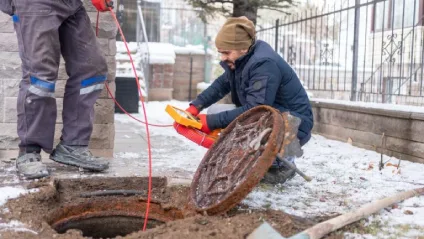Are you facing plumbing issues and wondering which method would be the best for repair or replacement? In Massachusetts, homeowners have two options – traditional and trenchless plumbing. Both methods are efficient in their own way, but which one is better? In this blog, we’ll take a closer look at both traditional and trenchless plumbing methods. We’ll discuss how they work, their efficiency, cost-effectiveness, impact on the environment, and the longevity of each method. We’ll also explore why trenchless plumbing is gaining popularity in Massachusetts and when traditional plumbing may be a better option. By the end of this article, you’ll have a clear understanding of which plumbing method would be best suited for your needs.
Understanding Plumbing Methods in Massachusetts
Plumbing methods in Massachusetts vary based on specific needs. Knowing the available methods helps homeowners make informed decisions. Understanding the pros and cons ensures efficient solutions for plumbing projects. Knowledge about plumbing methods is essential for tackling severe problems like damaged pipes or clogs. Homeowners can choose traditional sewer repair or the more durable trenchless option of pipelining with epoxy resin. Spencer Home Services specializes in trenchless sewer lining, using advanced techniques and sewer cameras to detect leaks and prevent mold.
Traditional Plumbing: Definition and Process
Traditional plumbing uses conventional methods and materials like copper or PVC pipes. It involves extensive digging and can disrupt landscaping and property. The installation process is labor-intensive. However, traditional plumbing may require frequent maintenance due to clogs and damaged pipes. Homeowners in Massachusetts should understand the definition and process of traditional plumbing for reliable sewer line repair options.

Trenchless Plumbing: Definition and Process
Trenchless plumbing, an innovative method that eliminates extensive digging, utilizes advanced techniques like pipe lining and pipe bursting. This process minimizes disruption to surrounding areas while providing durable and long-lasting results. Offering a more efficient and less invasive alternative to traditional methods, trenchless plumbing is ideal for repairing damaged pipes and preventing future clogs.
Trenchless plumbing is a game-changer in the industry. It offers superior durability and efficient sewer line repair through the use of resin liners and epoxy coatings. With trenchless plumbing, you can solve severe problems without digging, saving time, money, and reducing environmental impact caused by excavation. It’s a reliable and efficient solution to common plumbing issues.
The Evolution from Traditional to Trenchless Plumbing
Plumbing methods in Massachusetts have evolved to include trenchless options, revolutionizing the industry. This alternative offers homeowners improved efficiency, reduced costs, and durability with techniques like pipe lining and pipe bursting. Trenchless plumbing is a more efficient and less invasive way to repair damaged pipes, paving the way for advancements in the industry.

Comparing Trenchless and Traditional Plumbing Methods
When it comes to plumbing methods in Massachusetts, there are a few important factors to consider. Here’s a breakdown of how trenchless and traditional methods compare:
Trenchless Plumbing:
- Time and cost-saving benefits
- More environmentally friendly
- Long-lasting results
Traditional Plumbing:
- May be more familiar to homeowners and plumbers
- Can be less expensive upfront
- May require more maintenance over time
Overall, both trenchless and traditional plumbing methods have their pros and cons. It’s important to weigh the factors that are most important to you and your home when deciding which method to use.
Efficiency and Cost-Effectiveness
Trenchless plumbing methods have become increasingly popular in Massachusetts due to their efficiency and cost-effectiveness when compared to traditional methods. By minimizing disruption and labor, trenchless methods result in significant cost savings for homeowners and businesses alike. Additionally, the efficiency of trenchless plumbing reduces the overall project timeline, allowing for quicker completion and less inconvenience.
Trenchless plumbing methods offer durability and reduced maintenance. They use high-quality materials that resist corrosion and wear, resulting in less frequent repairs. This saves homeowners and businesses time and money in the long run. Trenchless plumbing is a reliable and efficient solution for Massachusetts’ plumbing needs.
Impact on Environment
Trenchless plumbing methods have a lower impact on the environment compared to traditional methods. Extensive digging and excavation in traditional plumbing cause disruption to the environment. Trenchless methods minimize the need for digging, reducing carbon emissions. The use of trenchless plumbing contributes to sustainable and eco-friendly practices by preserving the natural landscape and surrounding areas.
Which Plumbing Method Lasts Longer
When it comes to longevity, trenchless plumbing methods outshine traditional ones. Built with durable materials, trenchless systems are designed to last, reducing the need for frequent repairs. In contrast, traditional plumbing materials may deteriorate over time due to corrosion. Opting for trenchless plumbing ensures peace of mind and long-term savings.

Why is Trenchless Plumbing Gaining Popularity in Massachusetts
Trenchless plumbing is becoming increasingly popular in Massachusetts due to its many advantages. Homeowners in the state are drawn to its efficiency, convenience, and minimal disruption. Additionally, trenchless plumbing offers a modern and advanced solution for their plumbing needs, which explains the growing demand and high customer satisfaction.
When Would Traditional Plumbing be a Better Option
In certain circumstances, traditional plumbing may be preferred. When budget constraints are a concern, traditional methods can be more affordable. Simple projects without extensive excavation may also benefit from traditional plumbing. Consult with a professional plumber to determine the best option for your specific needs and requirements.
Conclusion
Both traditional and trenchless plumbing methods have their advantages. While traditional plumbing is suitable for some situations, trenchless plumbing is gaining popularity in Massachusetts due to its efficiency, cost-effectiveness, and minimal environmental impact. Trenchless plumbing also lasts longer, providing a more durable solution. However, it’s important to consider project requirements and consult with a professional plumber to determine the best method for your needs. Proper installation and maintenance are crucial for long-lasting and efficient performance, regardless of the chosen plumbing method.


